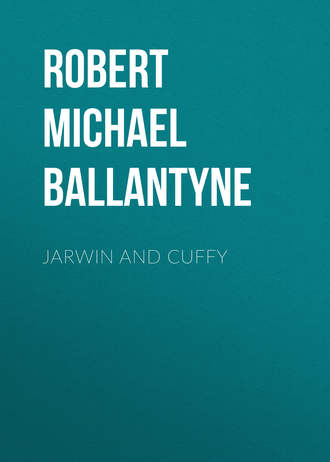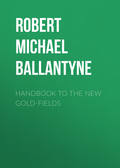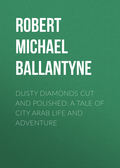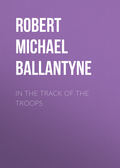
Robert Michael Ballantyne
Jarwin and Cuffy
“Ho! Cuffy—what’s that? Not a sail, eh?” exclaimed Jarwin, suddenly starting up, while his languid eyes kindled with excitement.
He was right. After a long, earnest, anxious gaze, he came to the conclusion that it was a sail which shone, white and conspicuous, like a speck or a snow-flake on the horizon.
Chapter Five.
Jarwin and Cuffy Fall into Bad Company
Immediately on discovering the sail, Jarwin hoisted a small canvas flag, which he had prepared for the purpose, to the mast-head, and then sat down to watch with indescribable earnestness the motions of the vessel. There was great cause for anxiety he well knew, because his raft was a mere speck on the great waste of waters which might easily be overlooked even by a vessel passing at a comparatively short distance, and if the vessel’s course should happen to lie across that of the raft, there was every probability she would only be visible for a short time and then pass away like a ray of hope dying out.
After gazing in perfect silence for half-an-hour, Jarwin heaved a deep sigh and said—
“She steers this way, Cuffy.”
Cuffy acknowledged the remark with a little whine and a very slight wag of his tail. It was evident that his spirits had sunk to a low ebb, and that he was not prepared to derive comfort from every trifling circumstance.
“Come, we’ll have a bit of summat to eat, my doggie,” said the sailor, reaching forward his hand to the provision bundle.
Thoroughly understanding and appreciating this remark, Cuffy roused himself and looked on with profound interest, while his master cut up a dried fish. Having received a large share of it, he forgot everything else, and devoted all his powers, physical and mental, to the business in hand. Although Jarwin also applied himself to the food with the devotion of a man whose appetite is sharp, and whose strength needs recruiting, he was very far indeed from forgetting other things. He kept his eyes the whole time on the approaching sail, and once or twice became so absorbed and so anxious lest the vessel should change her course, that he remained with his mouth half open, and with the unconsumed morsel reposing therein for a minute or more at a time.
But the vessel did not change her course. On she came; a fine large schooner with raking masts, and so trim and neat in her rig that she resembled a pleasure-yacht. As she drew near, Jarwin rose, and holding on to the mast, waved a piece of canvas, while Cuffy, who felt that there was now really good ground for rejoicing, wagged his tail and barked in an imbecile fashion, as if he didn’t exactly know whether to laugh or cry.
“We’re all safe now, doggie,” exclaimed Jarwin, as the schooner came cutting through the water before a light breeze, leaving a slight track of foam in her wake.
When within about two or three hundred yards of the raft, the castaway could see that a figure leant on the vessel’s side and brought a telescope to bear on him. With a feeling of irrepressible gladness he laughed and waved his hand.
“Ay, ay, take a good squint,” he shouted, “an’ then lower a boat—eh!—”
He stopped abruptly, for at that moment the figure turned towards the steersman; the schooner’s head fell away, presenting her stern to the raft, and began to leave her behind.
The truth flashed upon Jarwin like a thunderbolt. It was clear that the commander of the strange vessel had no intention of relieving him. In the first burst of mingled despair and indignation, the seaman uttered a bass roar of defiance that might have done credit to the lungs of a small carronade, and at the same time shook his fist at the retiring schooner.
The effect of this was as sudden as it was unexpected. To his surprise he observed that the schooner’s head was immediately thrown up into the wind, and all her sails shook for a few moments, then, filling out again, the vessel bent gracefully over on the other tack. With returning joy the castaway saw her run straight towards him. In a few minutes she was alongside, and her topsails were backed.
“Look out! catch hold!” cried a gruff voice, as a sailor sent a coil of rope whirling over the raft. Jarwin caught it, took a turn round the mast, and held on.
In a minute the raft was alongside. Weak though he was, Jarwin retained enough of his sailor-like activity to enable him to seize a rope and swing himself on board with Cuffy in his arms.
He found himself on the pure white deck of a craft which was so well appointed and so well kept, that his first impressions were revived—namely, that she was a pleasure-yacht. He knew that she was not a vessel of war, because, besides the absence of many little things that mark such a vessel, the few men on deck were not clothed like man-of-war’s-men, and there was no sign of guns, with the exception of one little brass carronade, which was probably used as a signal-gun.
A tall stout man, in plain costume, which was neither quite that of a seaman nor a landsman, stood with his arms crossed on his broad chest near the man at the wheel. To him, judging him to be the captain or owner of the vessel, Jarwin went up, and, pulling his forelock by way of salutation, said—
“Why, sir, I thought ’ee was a-goin’ to leave me!”
“So I was,” answered the captain, drily. “Hold on to the raft,” he added, turning to the man who had thrown the rope to Jarwin.
“Well, sir,” said the latter in some surprise, “in course I don’t know why you wos a-goin’ to leave a feller-creetur to his fate, but I’m glad you didn’t go for to do it, ’cos it wouldn’t have bin Christian-like. But I’m bound for to thank ’ee, sir, all the same for havin’ saved me—and Cuffy.”
“Don’t be too free with your thanks, my good man,” returned the captain, “for you’re not saved, as you call it, yet.”
“Not saved yet?” repeated Jarwin.
“No. Whether I save you or not depends on your keeping a civil tongue in your head, and on your answers to my questions.”
The captain interlarded his speech with many oaths, which, of course, we omit. This, coupled with his rude manners, induced Jarwin to suspect that the vessel was not a pleasure-yacht after all, so he wisely held his peace.
“Where do you belong to?” demanded the captain.
“To Yarmouth, sir.”
“What ship did you sail in, what has come of her, and how came you to be cast adrift?”
“I sailed in the Nancy, sir, from Plymouth, with a miscellaneous cargo for China. She sprung a leak in a gale, and we was ’bliged to make a raft, the boats bein’ all stove in or washed away. It was barely ready when the ship went down starn foremost. Durin’ the gale all my mates were washed off the raft or died of exposure; only me and my dog left.”
“How long ago was that?” asked the captain.
“Couldn’t rightly say, sir, I’ve lost count o’ time, but it’s more than a year gone by anyhow.”
“That’s a lie,” said the captain, with an oath.
“No, ’taint, sir,” replied Jarwin, reddening, “it’s a truth. I was nigh starved on that raft, but was cast on an island where I’ve bin till a few days ago ever since, when I put to sea on the raft that now lays a-starn there.”
For a few seconds the captain made no rejoinder, but a glance at the raft seemed to satisfy him of the truth of what was said. At length he said abruptly—
“What’s your name?”
“John Jarwin, sir.”
“Well, John Jarwin, I’ll save you on one condition, which is, that you become one of my crew, and agree to do my bidding and ask no questions. What say you?”
Jarwin hesitated.
“Haul up the raft and let this man get aboard of it,” said the captain, coolly but sternly, to the seaman who held the rope.
“You’ve no occasion to be so sharp, sir,” said John, remonstratively. “If you wos to tell me to cut my own throat, you know, I could scarce be expected for to do it without puttin’ a few questions as to the reason why. You’re a trader, I suppose?”
“Yes, I’m a trader,” replied the captain, “but I don’t choose to be questioned by you. All you’ve got to do is to agree to my proposal or to walk over the side. To tell you the truth, when I saw you first through the glass, you looked such a starved wretch that I thought you’d be of no use to me, and if it hadn’t been for the yell you gave, that showed there was something in you still, I’d have left you to sink or swim. So you see what sort of man you’ve got to deal with. I’m short-handed, but not so short as to engage an unwilling man, or a man who wouldn’t be ready for any sort of dirty work. You may take your choice.”
“Well, sir,” replied Jarwin, “I’ve no objection to take service with ’ee. As the sayin’ goes, ‘beggars mustn’t be choosers.’ I ain’t above doin’ dirty work, if required.”
John Jarwin, in the simplicity of his heart, imagined that the captain was in need of a man who could and would turn his hand to any sort of work, whether nautical or otherwise, on board ship or ashore, which was his idea of “dirty work;” but the captain appeared to understand him in a different sense, for he smiled in a grim fashion, nodded his head, and, turning to the seaman before mentioned, bade him cut the raft adrift. The man obeyed, and in a few minutes it was out of sight astern.
“Now, Jarwin, go below,” said the captain; “Isaacs will introduce you to your messmates.”
Isaacs, who had just cut away the raft, was a short, thick-set man, with a dark, expressionless face. He went forward without saying a word, and introduced Jarwin to the men as a “new ’and.”
“And a green un, I s’pose; give us your flipper, lad,” said one of the crew, holding out his hand.
Jarwin shook it, took off his cap and sat down, while his new friends began, as they expressed it, to pump him. Having no objection to be pumped, he had soon related the whole of his recent history. In the course of the narrative he discovered that his new associates were an unusually rough set. Their language was interspersed with frightful oaths, and their references to the captain showed that his power over them was certainly not founded on goodwill or affection. Jarwin also discovered that the freeness of his communication was not reciprocated by his new mates, for when he made inquiries as to the nature of the trade in which they were engaged, some of the men merely replied with uproarious laughter, chaff, or curses, while others made jocular allusions to sandal-wood trading, slaving, etcetera.
“I shouldn’t wonder now,” said one, “if you was to think we was pirates.”
Jarwin smiled as he replied, “Well, I don’t exactly think that, but I’m bound for to say the schooner has got such a rakish look that it wouldn’t seem unnatural like if you were to hoist a black flag at the peak. An’ you’ll excuse me, shipmets, if I say that yer lingo ain’t just so polished as it might be.”
“And pray who are you, that comes here to lecture us about our lingo?” cried one of the men fiercely, starting up and confronting Jarwin with clenched fists.
“Why, mate,” replied Jarwin, quietly folding back the cuffs of his coat, and putting himself in an attitude of defence, “I ain’t nobody in partikler, not the Lord Chancellor o’ England, anyhow still less the Archbishop of Canterbury. I’m only plain Jack Jarwin, seaman, but if you or any other man thinks—”
“Come, come,” cried one of the men in a tone of authority, starting forward and thrusting Jarwin’s assailant violently aside, “none o’ that sort o’ thing here. Keep your fists for the niggers, Bill, we’re all brothers here, you know; an affectionate family, so to speak!”
There was a general laugh at this. Bill retired sulkily, and Jarwin sat down to a plate of hot “lob-scouse,” which proved to be very good, and of which he stood much in need.
For several days our hero was left very much to himself. The schooner sped on her voyage with a fair wind, and the men were employed in light work, or idled about the deck. No one interfered with Jarwin, but at the same time no one became communicative. The captain was a very silent man, and it was evident that the crew stood much in awe of him. Of course Jarwin’s suspicions as to the nature of the craft were increased by all this, and from some remarks which he overheard two or three days after his coming on board, he felt convinced that he had fallen into bad company. Before a week had passed, this became so evident that he made up his mind to leave the vessel at the very first opportunity.
One day he went boldly to the captain and demanded to know the nature of the trade in which the schooner was employed and their present destination. He was told that that was no business of his, that he had better go forward and mind his duty without more ado, else he should be pitched overboard. The captain used such forcible language when he said this, and seemed so thoroughly in earnest, that Jarwin felt no longer any doubt as to his true character.
“I’ll tell you what it is, my lad,” said the captain, “my schooner is a trader or a man-of-war according to circumstances, and I’m a free man, going where I choose and doing what I please. I treat my men well when they do their duty; when they don’t I make ’em walk the plank. No doubt you know what that means. If you don’t we shall soon teach you. Take to-night to think over it. To-morrow morning I’ll have a question or two to ask you. There—go!”
Jarwin bowed submissively and retired.
That night the moon shone full and clear on the wide ocean’s breast, and Jarwin stood at the bow of the schooner, looking sadly over the side, and patting his little dog gently on the head.
“Cuffy, you and me’s in a fix, I suspect,” he murmured in a low tone; “but cheer up, doggie, a way to escape will turn up no doubt.”
He had scarcely uttered the words when his eye fell on the distant outline of land on the lee bow. He started, and gazed with fixed intensity for some minutes, under the impression that it might perhaps be a fog-bank lighted by the moon, but in a short time it became so distinct that there could be no doubt it was land. He pointed it out to the watch on deck, one of whom said carelessly that he had seen it for some time, and that there were plenty more islands of the same sort in these seas.
Jarwin walked aft and stood near the lee gangway contemplating the island in silence for some time. A small oar lay at his feet. Suddenly he conceived the daring idea of seizing this, plunging overboard and attempting to swim to land. He was a splendid swimmer, and although the island appeared to be more than two miles distant, he did not fear failure. A moment’s reflection, however, convinced him that the men on deck would certainly hear the plunge, heave the ship to, and lower a boat, in which case he should be immediately overtaken. Still, being resolved to escape at all hazards, he determined to make the venture. Fastening a rope to a belaying pin, he tied the oar to it and lowered it over the side until it trailed in the water, he then lifted Cuffy, who was almost always near him, on to the side of the vessel, with a whisper to keep still. The watch paced the weather side of the deck conversing in low tones. The steersman could, from his position, see both gangways, and although the light was not strong enough to reveal what Jarwin was about, it was too strong to admit of his going bodily over the side without being observed. He, therefore, walked slowly to the head of the vessel, where he threw over the end of a small rope. By means of this, when the watch were well aft, he slid noiselessly into the sea, hanging on by one hand and supporting Cuffy with the other. Once fairly in the water he let go, the side of the vessel rubbed swiftly past him, and he all but missed grasping the oar which trailed at the gangway. By this he held on for a few seconds to untie the rope. He had just succeeded and was about to let go, when, unfortunately, the handle of the oar chanced to hit the end of Cuffy’s nose a severe blow. The poor dog, therefore, gave vent to a loud yell of pain. Instantly Jarwin allowed himself to sink and held his breath as long as he possibly could, while Cuffy whined and swam on the surface.
Meanwhile the men on deck ran to the side. “Hallo!” cried one, “it’s Jarwin’s little dog gone overboard.”
“Let it go,” cried another with a laugh; “it’s a useless brute and eats a power o’ grub.”
“I say, wot a splashin’ it do kick up,” he added as the little dog was left astern making vain efforts to clamber on the oar. “Why, lads, there’s somethin’ else floatin’ beside it, uncommon like a seal. Are ’ee sure, Bill, that Jarwin hasn’t gone overboard along with his dog?”
“Why no,” replied Bill; “I seed him go forward a little ago; besides it ain’t likely he’d go over without givin’ a shout.”
“I dun know that,” said the other; “he might have hit his head again’ somethin’ in tumblin’ over.”
By this time the objects in question were almost out of sight astern. In a few minutes more a dark cloud covered the moon and effectually shut them out from view.
Just then the Captain came on deck, and asked what was wrong.
“Fools!” he exclaimed, in a voice of thunder, on being told, “lower the gig. Look sharp! Don’t you see the land, you idiots? The man’s away as well as the dog.”
In a few seconds the topsails were backed and the boat lowered, manned, and pushed off.
But Jarwin heard and saw nothing of all this. He was now far astern, for the vessel had been going rapidly through the water.
On coming to the surface after his dive he caught hold of Cuffy, and, with a cheering word or two, placed him on his back, telling him to hold on by his paws the best way he could. Then grasping the end of the oar, and pointing the blade land-wards, he struck out vigorously with his legs.
It was a long and weary swim, but as his life depended on it, the seaman persevered. When he felt his strength giving way, he raised not only his heart but his voice in prayer to God, and felt restored each time that he did so. Just as he neared the shore, the sound of oars broke on his ears, and presently he heard the well-known voice of the Captain ordering the men to pull hard. Fortunately it was by this time very dark. He landed without being discerned. The surf was heavy, but he was expert in rough water, went in on the top of a billow, and was safely launched on a soft sandy beach, almost at the same moment with the boat. The latter was, however, at a considerable distance from him. He crept cautiously up the shore until he gained a thicket, and then, rising, he plunged into the woods and ran straight before him until he was exhausted, carrying the little dog in his arms. Many a fall and bruise did the poor fellow receive in his progress, but the fear of being retaken by the pirates—for such he felt convinced they were—lent him wings. The Captain and his men made a long search, but finally gave it up, and, returning to the boat, pushed off. Jarwin never saw them again.
He and Cuffy lay where they had fallen, and slept, wet though they were, till the sun was high. They were still sleeping when a native chief of the island, happening to pass along the beach, discerned Jarwin’s footsteps and traced him out. This chief was an immensely large powerful man, armed with a heavy club. He awoke the sailor with a kick, and spoke in a language which he did not understand. His gestures, however, said plainly enough, “Get up and come along with me,” so Jarwin thought it best to obey. Of course whatever Jarwin thought, Cuffy was of precisely the same opinion. They therefore quietly got up and followed the big chief to his village, where they were received by a large concourse of savages with much excitement and curiosity.
Chapter Six.
Our Hero Becomes a Favourite, and Entertains Hopes of Escape
The sufferings which Jarwin with his little dog had hitherto undergone were as nothing compared to those which he endured for some months after being taken prisoner by the savages. At first he gave himself up for lost, feeling assured that ere long he would be sacrificed in the temple of one of their idols, and then baked in an oven and consumed as food, according to the horrible practice of the South-Sea Islanders. Indeed he began to be much astonished that, as day after day passed, there was no sign of any intention to treat him in this way, although several times the natives took him out of the hut in which he was imprisoned, and, placing him in the centre of a circle, held excited and sometimes angry discussions over him.
It was not till months afterwards, when he had acquired a slight knowledge of their language, that he came to understand why he was spared at this time. It appeared that four shipwrecked sailors, who had been cast on a neighbouring island, had been killed, baked, and eaten, according to usage, by the chief and his friends. Immediately afterwards, those who had partaken of this dreadful food had been seized with severe illness, and one or two had died. This fact had been known for some time to Jarwin’s captors, and the discussions above referred to had been engaged in with reference to the question whether it was likely that the flesh of the white man who had been thrown on their island would be likely to disagree with their stomachs! It was agreed that this was highly probable, and thus the seaman’s life was spared; but he was sometimes tempted to wish that it had not been spared, for his master, the Big Chief, was a very hard man; he put him to the most toilsome labour, and treated him with every sort of indignity. Moreover, he was compelled to be a witness of practices so revolting and cruel, that he often put the question to himself whether it was possible for devils to display greater wickedness and depravity than these people.
Jarwin was frequently tempted to resent the treatment he received, but, fortunately, he was prudent enough to bear it submissively, for it is certain that if he had rebelled he would have been slain on the spot. Moreover, he set himself to carry out his favourite maxim—namely, that it was wise in all circumstances to make the best of everything. He laboured, therefore, with such goodwill, that he softened the breast of the Big Chief, who gradually became more amiable, and even indulgent to him. Thus he came to know experimentally the wisdom of that Scripture, “Be not overcome of evil, but overcome evil with good.”
John Jarwin possessed a remarkably fine sonorous bass voice, which, in former days, had been a source of great delight to his messmates. Although strong and deep, it was very sweet and tender in its tones, and eminently suited for pathetic and sentimental songs. Indeed Jarwin’s nature was so earnest, that although he had a great deal of quiet humour about him, and could enjoy comic songs very much, he never himself sang anything humorous. Now, it chanced that the Big Chief had a good ear for music, and soon became so fond of the songs which his slave was wont to hum when at work, that he used to make him sit down beside him frequently and sing for hours at a time! Fortunately, Jarwin’s lungs were powerful, and his voice being full-toned and loud, he was able to sing as much as his master desired without much exertion. He gave him his whole budget which was pretty extensive—including melodies of the “Black-eyed Susan” and “Ben Bolt” stamp. When these had been sung over and over again, he took to the Psalms and Paraphrases—many of which he knew by heart, and, finally, he had recourse to extempore composition, which he found much easier than he had expected—the tones flowing naturally and the words being gibberish! Thus he became a sort of David to this remarkable Saul. By degrees, as he learnt the native tongue, he held long conversations with the Big Chief, and told him about his own land and countrymen and religion. In regard to the last the Chief was very inquisitive, and informed his slave that white men had been for some time in that region, trying to teach their religion to the men of an island which, though invisible from his island, was not very far distant. Jarwin said little about this, but from that time he began to hope that, through the missionaries, he might be able to make his escape ere long.
During all this time poor Cuffy experienced a variety of vicissitudes, and made several narrow escapes. At first he had been caught and was on the point of being killed and roasted, when he wriggled out of his captor’s grasp and made off to the mountains, terrorstruck! Here he dwelt for some weeks in profound melancholy. Being unable to stand separation from his master any longer, he ventured to return to the village, but was immediately hunted out of it, and once again fled in horror to the hills. Jarwin was not allowed to quit the village alone, he therefore never saw his little dog, and at length came to the conclusion that it had been killed. When, however, he had ingratiated himself with his master, he was allowed more freedom, and one day, having wandered a considerable distance into the mountains, he came suddenly and unexpectedly upon Cuffy. Having experienced nothing from man of late but the most violent and cruel treatment, Cuffy no sooner beheld, as he supposed, one of his enemies, than, without giving him a second glance, he sprang up, put his ears back, his tail between his legs, and, uttering a terrible yell, fled “on the wings of terror!” But Jarwin put two fingers in his mouth and gave a peculiarly shrill whistle, which brought the dog to a sudden stop. He looked back with ears cocked. Again Jarwin whistled. Instantly Cuffy turned and ran at him with a series of mingled yells, whines, and barks, that gave but a faint idea of his tumultuous feelings. It would scarcely be too much to say that he almost ate his master up. He became like an india-rubber ball gone mad! He bounded round him to such an extent that Jarwin found it very difficult to get hold of or pat him. It is impossible to do justice to such a meeting. We draw a veil over it, only remarking that the sailor took his old favourite back to the village, and, after much entreaty and a good deal of persuasive song, was permitted to keep him.
About ten months after this event, war broke out between the Big Chief and a neighbouring tribe of natives, who were a very quarrelsome and vindictive set. The tribe with whom Jarwin dwelt would gladly have lived at peace, but the other tribe was stronger in numbers and thirsted for conquest—a consequence of strength which is by no means confined to savages!
When war was formally declared, the Big Chief told Jarwin to prepare himself for battle. At first our hero had some qualms of conscience about it, but on reflecting that on the part of the tribe to which he belonged it was a war of self-defence, his conscience was pacified.
The Big Chief ordered him to throw away his now ragged garments, smear his whole body over with oil and red earth, paint black spots on his cheeks, and a white streak down his nose, and put on warrior’s costume. In vain Jarwin begged and protested and sang. The Big Chief’s blood was up, and his commands must be obeyed, therefore Jarwin did as he was bid; went out to battle in this remarkable costume—if we may so style it—and proved himself such a prodigy of valour that his prowess went far to turn the tide of victory wherever he appeared during the fight. But we pass over all this. Suffice it to say, that the pugnacious tribe was severely chastised and reduced to a state of quiet—for the time at least.
One day, not long after the cessation of the war, a canoe arrived with several natives, all of whom wore clothing of a much more civilised description than is usually seen among South-Sea savages. They had a long, earnest talk with the natives, but Jarwin was not allowed to hear it, or to show himself. Next day they went away. For some time after that Big Chief was very thoughtful, but silent, and Jarwin could not induce him to become confidential until he had sung all his melodies and all his psalms several times over, and had indulged in extempore melody and gibberish until his brain and throat were alike exhausted. The Big Chief gave way at last, however, and told him that his late visitors were Christians, who, with two native teachers, had been sent from a distant island by a white chief named Williams, to try and persuade him and his people to burn their idols.
“And are ’ee goin’ to do it?” asked Jarwin.
“No,” replied the Chief, “but I am going to Raratonga to see Cookee Williams.”
Of course they conversed in the native tongue, but as this would be unintelligible to the reader, we translate. It may also be remarked here that “Cookee” signified a white man, and is a word derived from the visit of that great navigator Captain Cook to these islands, by the natives of which he was ultimately murdered.
Jarwin had heard, while in England, of the missionary Williams. On learning that he was among the islands, his heart beat high, and he begged earnestly that he might be allowed to go with the chief and his party to Raratonga, but his wily master would not consent “You will run away!” he said.
“No, I won’t,” said Jarwin, earnestly. Big Chief shook his head. “They will take you from me,” he said, “when they find out who you are.”
“I’ll not let ’em,” replied Jarwin, with pathetic sincerity, and then began to sing in such a touching strain, that his master lay back on his couch and rolled his large eyes in rapture.
“You shall go, Jowin,” (that was the best he could make of the name), “if you will make me a promise.”
“Name it, old boy,” said Jarwin.
“That you will go dressed like one of my young men, and never open your lips to speak a word, no more than if you were dumb, whether the Cookees speak to you or not.”
Jarwin hesitated, but reflecting that there was no chance of his seeing the missionary at all if he did not give this promise, he consented.
A week after that all the preparations were made, and four large canoes, full of well-armed men, set out for Raratonga.
At the time we write of, the island of Raratonga had been recently discovered by the missionary Williams. The success of the labours of that devoted man and his native teachers, is one of the most marvellous chapters in the history of the isles of the Pacific. At Raratonga, God seemed to have prepared the way for the introduction of the Gospel in a wonderful manner, for although the native teachers who first went ashore there were roughly handled, they were enabled, nevertheless, to persevere, and in not much more than a single year, the Gospel wrought a change in the feelings and habits of the people, which was little short of miraculous. Within that brief period they had given up and burnt all their idols, had ceased to practise their bloody and horrible rites, and had embraced Christianity—giving full proof of their sincerity by submitting to a code of laws founded on Scripture, by agreeing to abandon polygamy, by building a large place of worship, and by leading comparatively virtuous and peaceful lives. And all this was begun and carried on for a considerable time, not by the European missionaries but by two of the devoted native teachers, who had previously embraced Christianity.







